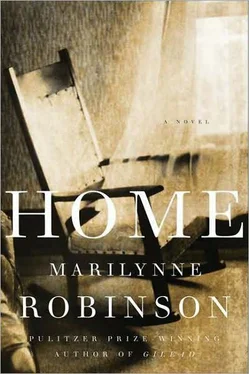When she was small she had confused, in fact fused, the words “secret” and “sacred.” In church you must not even whisper. There are words you must never say. There are things that will be explained to you when you are old enough to understand. She had whispered compulsively, in church and out. Her big sisters would say, This is a secret. You must never ever tell, promise you’ll never tell. Cross your heart. Then they would murmur in her ear something meaningless or obvious or entirely untrue and watch her suffer with the burden of it for ten or fifteen minutes. The joke was that she could not keep a secret, that she would whisper behind a cupped hand into the first obliging ear whatever remained of the nonsense confided to her. But “hope to die” and “if I die before I wake” also became linked in her mind, aware as she was that she broke her vows constantly. Once, when she was still too young for school and Jack ought to have been in school but was not, she saw him out in the orchard, and she went to him, weeping with what had become an unbearable fear. He looked at her and smiled and said, “Damnit, kid, grow up.” Then he said, “Are you going to tell on me? Are you going to get me in trouble?” She did not. That was the first secret she kept. It seemed to her she had learned honor then, perhaps simply because she was of an age and predisposed. Perhaps in the whole of her life she had never really distinguished the secret from the sacred, and loved tact and discretion better than she should. Well, in all this she may only have been a Boughton, after all.
But at thirty-eight she was still wary of country songs and human interest stories. She was wary indeed of certain thoughts, certain memories, because her father could not bear her unhappiness. His face fell when he saw any sign of it. So she did not permit herself to brood, strong as the urge was sometimes. It would make him miserable.
Her parents had watched her and worried over her in the days of what were, insofar as they might ever know, Jack’s crowning disgrace, and they considered her feelings with a seriousness that interested her. Her feelings were largely untried then. She was about to enter her sixteenth year of gentle life in a quiet place, which meant only that her passions and convictions were uncomplicated and potent, that they strove together like figures in allegory. Truth must be stalwart, Loyalty absolute, Generosity unstinting, while Appearance and Convention were children of the giant Hypocrisy and must be put to flight. She had not had time or occasion to think far into the implications of loyalty or generosity. She really had no idea what she was thinking about, sheltered as she was. How it had happened that Jack had a child, for example. It seemed to her to be a fairly delightful thing, though this was an opinion she kept to herself. She knew from books and also from fragments of rumors on the same general subject that she was wrong to take so simple a view of the matter. Her parents really were the last people on earth to weep and whisper over the birth of a grandchild, and she knew she needed to find some way to take their sorrow into account. So much had never been explained to her. They were that kind of family. Things necessary to know were passed along brother to brother, sister to sister, and this was sufficient for most purposes, despite inevitable error and sensationalism. But the chain of transmission was broken when Grace left to live with Hope in Minneapolis, and her parents had forgotten the problem, having so long depended on their children to startle one another with this information.
Her parents were, in their way, fully as innocent as she was, having put aside their innocence on practical grounds, not in the belief that it had been discredited, but because they accepted the terms of life in this world as a treaty to be preferred to conflict, though by no means ideal in itself. Experience had taught them that truth had sharp edges and hard corners, and could be seriously at odds with kindness. They had learned that excessive devotion to even the highest things seemed and probably was sanctimonious, and that the one sufficient measure of excess was that look of annoyance, confirmed in themselves by a twinge of embarrassment, that meant the line had been crossed. They recognized grace in the readiness of the darkest sinner to take a little joke, a few self-effacing words, as an apology. This was something her father in particular, who was morally strenuous but sociable, too, had learned to appreciate cordially. Truly there were perils on every side in the pastoral life, and her father was wary of them all. With the dreadful rigor of an upright child Glory had noted and pondered his accommodations, however minor or defensible. This was in part an effect of her finding herself in a suddenly quiet house with only her parents to think about.
Still, Glory’s view of things had an authority for them precisely because it was naïve. A baby is a splendid gift of God, after all. Her father had never christened one without saying those words. And if Jack had behaved disgracefully toward its mother—“She is so young, so young!” her father whispered — this did not alter the basic fact that the infant was a child of the family, deserving of welcome and embrace. Glory had really not understood why misery was any important part of her parents’ response to the situation. The girl could not have been much younger than Glory herself, and she was fairly sure she would not have minded having a baby. Imbecile as she was then with loneliness and youth, and far as she was from understanding why her father should feel that arrogance had a part in it all, or cruelty. Or why he whispered those words with such bitter emphasis. Every Sunday when the boys were home her father would stand at the front of the church, waiting for the pews to fill. Her brothers would file in, three of them, and her father would wait a moment more, watching the doorway, glancing up at the balcony. Then his head would fall to one side, regret and forgiveness in one gesture. Sometimes, rarely, he would nod to himself and smile, and then they knew that Jack was there, and that the sermon would be about joy and the goodness of God no matter what the text was. She had never heard her father say such hard words — the cruelty of it! the arrogance! — and she had never seen him brood and mutter for days at a time, as if he were absorbing the fact that some transgressions are beyond a mere mortal’s capacity to forgive. How often those same hard, necessary words had come to her mind.
But in those days their lives were lived so publicly, it had seemed to her they might as well just acknowledge what everyone would have known in any case. She had never had any reason to think her parents had other intentions, but she might have helped them, she thought, by giving them herself to worry about. They both believed firmly in the power of example. This would be a great act of moral instruction. They must act consistently with their faith. They must consider all its applications in the present circumstance. Yes! She watched as her father mustered his courage. “The Lord has been very good to me!” he said, reminding himself that his obligations were correspondingly great, in fact limitless. This was a thought he always found exhilarating. Jack had left his car keys on the piano and taken the train back to college. She was almost old enough to drive, and she was fairly sure she knew how it was done. So she took her father out into the country to see that baby. It was disturbing to remember how happy she had been then, in the very middle of his deepest grief.
It was being home that made her remember, being alone in all that silence, or sitting beside the irksome radio trying to read the book she had chosen as possibly least unreadable among the hundreds of old books in the scores of shelves and bookcases that narrowed the overfurnished rooms. “Saber Dance,” of course. “The 1812 Overture.” This is Gabriel Heatter with the news. Her father would rouse himself from time to time for a game of checkers or Monopoly. This was for her sake. In her childhood, when she was kept home in bed by chicken pox, measles, and mumps, or by the flu, her father came up to her room with a bag of mints and a bottle of ginger ale and the Monopoly set, and played a brief and hilarious game with her, pulling get-out-of-jail cards from his sleeves, losing his token in the bedspread and finding it behind her ear. Now from time to time he cheated for her benefit. He would slyly stop just short of landing on Boardwalk, when he had plenty of money to buy it and already owned Park Place. It made her sad. On the same grounds he was not to be trusted with the bank.
Читать дальше












